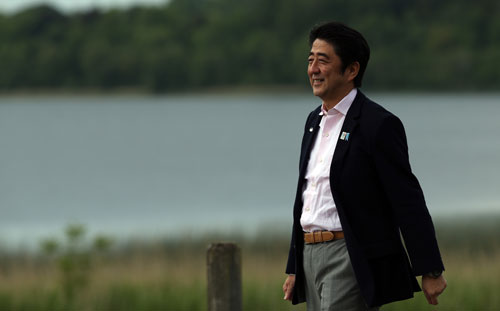Personal Wealth Management /
Abe Wins a Landslide. Now What?
The Liberal Democratic Party’s landslide victory in Japan’s upper house election doesn’t much improve the outlook for Japanese stocks.
With a strong poll lead, Japanese PM Shinzo Abe was all smiles at last month’s G8 summit. Photo by Matt Cardy/Getty Images.
The Liberal Democratic Party (LDP) and New Komeito coalition cruised to victory in Japan’s upper house election Sunday, cementing their control of both houses of the Diet. Theoretically, this gives Prime Minister Shinzo Abe political capital to pursue the economic reforms left off the agenda in June. However, we’re still skeptical—the election doesn’t much change Japan’s recent story, and in our view, investors shouldn’t regard Sunday’s outcome as a sign to rush headlong into Japanese stocks.
On paper, Abe has more clout than any of Japan’s PMs since Junichiro Koizumi—a strong majority and three-plus years before the next election. But in reality, this majority includes many entrenched interests who aren’t so jazzed about various economic reforms. For one, the agricultural lobby opposes lifting tariffs on rice, beef, wheat, dairy and other foodstuffs, which could prove sticking points in Japan’s free-trade negotiations. As could Japan Post’s push to expand its insurance business—which could get a boost from former national postmasters association chief Yoshifumi Tsuge’s victory Sunday—considering US trade officials have long decried the state-run behemoth’s presence in Japan’s insurance and banking industries. On the domestic front, the Japan Business Federation supports much-needed corporate tax cuts but likely opposes corporate governance reforms. Immigration reforms, labor reforms and other much-needed changes likely encounter similar internal opposition, and it’s just not clear whether Abe has the clout to overcome this—or the chutzpah to try.
Plus, Abe isn’t immune to voters’ whims. If he loses popular support, other party factions could call—and potentially win—a leadership contest. This might appear low-risk at the moment, with Abenomics enjoying 70% approval, but polls can change quickly. For example, the national sales tax is set to increase from 5% to 8% next year. It is widely considered a necessary evil to improve Japan’s fiscal footing, but it’s very unpopular—it led to previous PM Yoshihiko Noda’s downfall. Abe likely has to weigh risking a small popularity hit or a potential market reaction if he attempted to delay or cancel implementation. Moreover, if he tries to cut corporate taxes while allowing sales taxes to rise, voters could get especially touchy. Restarting nuclear power plants—a necessary move to curb Japan’s reliance on expensive imported fuel could also ding Abe’s popularity, as anti-nuclear sentiment still outweighs voters’ frustration over higher energy bills. Abe could very well spend all his political capital on these issues and the Trans-Pacific Partnership free trade agreement, limiting his ability to accomplish other reforms.
One other potential source of uncertainty did clear up a bit, though. Supporters of constitutional amendment fell short of the two-thirds majority necessary to make changes. Abe conceded this point after the election, essentially putting his plans to revise Article 96, which outlines the amendment process, and Article 9, the infamous “anti-war” clause, on ice. This makes it somewhat less likely nationalistic issues distract from economic reform looking forward, though we rather doubt Abe is ready to slam the door on his lifelong ambition.
Looking ahead, Abe has said he’ll unveil the next phase of his structural reform plans in September, suggesting he’ll include more specifics than he did in June. But game-changing initiatives still appear to be off the agenda. Instead of tackling important but politically charged items like immigration and labor reform, the legislative centerpiece is likely incremental tax reforms to incentivize business investment. Japan’s capex woes stem largely from its rigid labor code—inflexible payrolls don’t leave firms much latitude to invest and hinder productivity. Abe likely tries to do an end run around this by subsidizing new capital investment. This might help some in the near term, but it is a patchwork solution—it doesn’t address the underlying issue.
So the waiting game continues. If Abe follows his September announcement with deeper, less popular proposals, if he can overcome entrenched vested interests within his own party, and if voters don’t sour on him over higher sales taxes and nuclear power, then Japan could get on the road to lasting economic improvement. But those are three big IFs—and investors’ expectations seem high. The chance reality exceeds or even meets lofty expectations seems slim, so we see little likelihood Japan outperforms in the foreseeable future.
If you would like to contact the editors responsible for this article, please message MarketMinder directly.
*The content contained in this article represents only the opinions and viewpoints of the Fisher Investments editorial staff.
Get a weekly roundup of our market insights
Sign up for our weekly e-mail newsletter.

You Imagine Your Future. We Help You Get There.
Are you ready to start your journey to a better financial future?

Where Might the Market Go Next?
Confidently tackle the market’s ups and downs with independent research and analysis that tells you where we think stocks are headed—and why.






